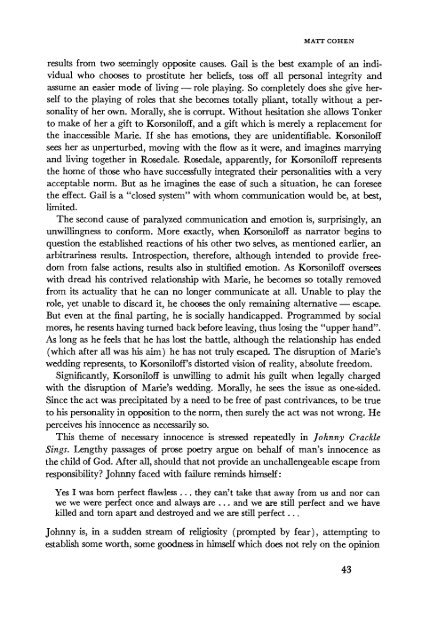MATT COHEN'S MONOLOGUE IN MORALITY
MATT COHEN'S MONOLOGUE IN MORALITY
MATT COHEN'S MONOLOGUE IN MORALITY
Create successful ePaper yourself
Turn your PDF publications into a flip-book with our unique Google optimized e-Paper software.
<strong>MATT</strong> COHENresults from two seemingly opposite causes. Gail is the best example of an individualwho chooses to prostitute her beliefs, toss off all personal integrity andassume an easier mode of living — role playing. So completely does she give herselfto the playing of roles that she becomes totally pliant, totally without a personalityof her own. Morally, she is corrupt. Without hesitation she allows Tonkerto make of her a gift to Korsoniloff, and a gift which is merely a replacement forthe inaccessible Marie. If she has emotions, they are unidentifiable. Korsoniloffsees her as unperturbed, moving with the flow as it were, and imagines marryingand living together in Rosedale. Rosedale, apparently, for Korsoniloff representsthe home of those who have successfully integrated their personalities with a veryacceptable norm. But as he imagines the ease of such a situation, he can foreseethe effect. Gail is a "closed system" with whom communication would be, at best,limited.The second cause of paralyzed communication and emotion is, surprisingly, anunwillingness to conform. More exactly, when Korsoniloff as narrator begins toquestion the established reactions of his other two selves, as mentioned earlier, anarbitrariness results. Introspection, therefore, although intended to provide freedomfrom false actions, results also in stultified emotion. As Korsoniloff overseeswith dread his contrived relationship with Marie, he becomes so totally removedfrom its actuality that he can no longer communicate at all. Unable to play therole, yet unable to discard it, he chooses the only remaining alternative — escape.But even at the final parting, he is socially handicapped. Programmed by socialmores, he resents having turned back before leaving, thus losing the "upper hand".As long as he feels that he has lost the battle, although the relationship has ended(which after all was his aim) he has not truly escaped. The disruption of Marie'swedding represents, to Korsomloff's distorted vision of reality, absolute freedom.Significantly, Korsoniloff is unwilling to admit his guilt when legally chargedwith the disruption of Marie's wedding. Morally, he sees the issue as one-sided.Since the act was precipitated by a need to be free of past contrivances, to be trueto his personality in opposition to the norm, then surely the act was not wrong. Heperceives his innocence as necessarily so.This theme of necessary innocence is stressed repeatedly in Johnny CrackleSings. Lengthy passages of prose poetry argue on behalf of man's innocence asthe child of God. After all, should that not provide an unchallengeable escape fromresponsibility? Johnny faced with failure reminds himself:Yes I was born perfect flawless ... they can't take that away from us and nor canwe we were perfect once and always are ... and we are still perfect and we havekilled and torn apart and destroyed and we are still perfect...Johnny is, in a sudden stream of religiosity (prompted by fear), attempting toestablish some worth, some goodness in himself which does not rely on the opinion43
















